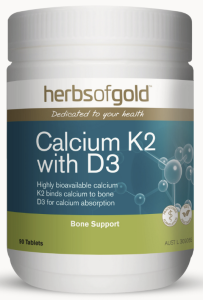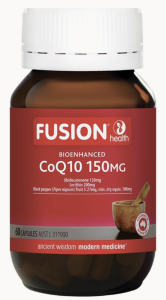HEALTH TOPICS
Stop the Menopause Madness
Posted by: Gillian Day BHSc. Comp Med, Adv Dip Nat, AFMCP Grad
As a woman, you know that ‘someday’ you’re going to go through menopause. However, the biggest misconception about menopause and its fab friend, perimenopause is that it happens when you’re old! Unfortunately, for a lot of women, menopause isn’t just the simple end of their period. It can wreak daily havoc on your brain, your body and your life. No matter where you are in your reproductive years, it’s important to prepare for perimenopause and beyond so you can sail through your change of life with as little, or even no disruption to your normal life!
What is menopause?
Menopause marks the end of a womans reproductive years and her monthly cycle of menstruation. This happens when the ovaries no longer’ contain or release eggs and is officially dated as 12 months to the day since your last menstrual period. Read more about your monthly menstrual cycle in my recent blog; Ovulation calculator……..the beginners guide to healthy hormones and fertility Menopause generally occurs naturally at the average age of 51. However, many women experience perimenopause and menopause prematurely. For a small percentage of women, they experience their last menstrual period before the age of 40, which is known as primary ovarian insufficiency.
What is Perimenopause?
Perimenopause is generally the 5-10 years before a woman reaches menopause. This is the most common time to experience symptoms, which can often be debilitating. Generally, women start to experience perimenopause in the their early to mid 40’s, however many women experience symptoms in their mid to late 30’s.
How do you know if it’s happening to you?
Menopause and perimenopause symptoms
Basically, when you start the journey into perimenopause and menopause, your body begins to produce different/smaller amounts of hormones; namely, oestrogen, progesterone and testosterone. At times, these fluctuations can be wild and may result in one, some or all of the symptoms below.
- Changes in your period – mid cycle spotting, lighter periods, heavier periods, longer periods, periods that disappear for months at a time
- Emotional/mental symptoms – memory loss/confusion, mood swings and irritability, anxiety and/or depression, easier to feel overwhelmed, crying, bursts of anger, low sex drive/lack of libido
- Physical symptoms – hot flashes, night sweats, insomnia, dry skin/hair, dry and itchy eyes, lack of energy, hair loss, facial hair, acne, deepening voice, heart palpitations, weight gain, aches and pains, painful sex, vaginal dryness, urinary tract infection (UTI) symptoms, infertility, intense food cravings, insatiable appetite, weight gain
Testing options
It’s always best to test, and not guess with your health. Here are the tests I find helpful when supporting my clients.
- FSH – follicle stimulating hormone
- DHEA – dehydroepiandrosterone. This hormone helps us to rebuild, restore and regenerate and decreases as we age
- Estradiol. This is the ‘main’ type of oestrogen produced in our reproductive years and is secreted by the ovaries. A drop in this hormone can cause memory loss, anxiety, depression, insomnia, night sweats, hot flashes and more
- Free & total testosterone. Even though you may think of testosterone as a ‘male’ hormone, healthy levels of testosterone are required by women to maintain a healthy sex drive, strong bones, muscle mass and good mental health.
- TSH, T3 and T4 – thyroid hormones. Many of the symptoms of menopause actually mimic the same symptoms of certain thyroid conditions. It’s important to know which is which.
What can you do about it? Natural Solutions
Getting the nutrients, vitamins and minerals your body requires from your diet alone is nice in theory, however menopause is a delicate time which can increase the need of your body for certain nutrients. Quality menopause supplements and herbs can help make the difference and provide natural support. In addition to the tailored solutions below, we offer a comprehensive range of menopause multi formulas.
Hot flashes – Sage
Whilst it is easy enough to make a sage tea, it is only sage in supplemental from that has been found to reduce hot flashes by up to 50% in 4 weeks and 64% in 8 weeks and may also assist with some of the psychological symptoms of menopause, including anxiety and depression. Take 1 capsule 3 times daily. In addition, try to identify and avoid your personal hot flush triggers. Common triggers include; spicy food, hot food or drinks, cigarettes, caffeine, alcohol and weight gain.
Phytoestrogens
Phytoestrogens are substances that occur naturally in some plants. They contain oestrogen like properties. In a perimenopausal or menopausal woman, phytoestrogens may help to ease the symptoms that occur due to low oestrogen. Now….there are a lot of mixed messages when it comes to phytoestrogens. Some people think they’re saviours, others think they’re evil. Understanding phytoestrogens is a complex discussion. Stay tuned as next week I’ll be walking you through the basics of phytoestrogens so you can understand and make the most informed choice.
GR8 Health Supplements rich in phytoestrogens
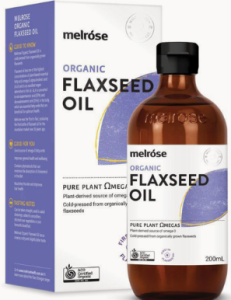 Flaxseed oil
Flaxseed oil
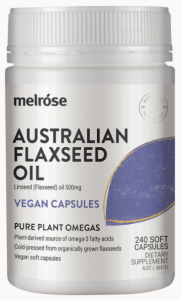 Flaxseed oil capsules
Flaxseed oil capsules
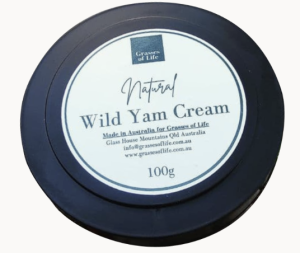 Wild Yam
Wild Yam
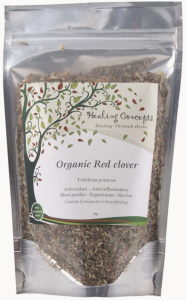 Red Clover
Red Clover
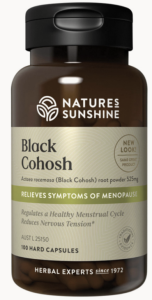 Black Cohosh
Black Cohosh
Vitamin K
Fluctuating oestrogen levels can cause a loss of bone mass, which is the greatest risk factor for developing osteoporosis. Note; be sure to talk to your healthcare practitioner if you are taking warfarin, or other blood thinning medication.
Calcium
After menopause, we start breaking down bone, faster that we can make new bone. This is where Calcium can provide support. No more than 1000mg per day is required.
Vitamin D
The ability to convert sunlight to vitamin D in the body decreases as we age. Plus, in Australia we are now so sun smart, all the slip-slop-slapping has prevented us from getting the sunlight we need. The recommended amount of vitamin D is hard to achieve through diet alone. I generally prescribe 600IU of vitamin D in all of my female clients over the age of 50. Note – get all 3 (vitamin K, calcium and vitamin D) in 1 convenient formula; Herbs of Gold Calcium with K2 and D3
CoQ10
The significant drop in hormones throughout perimenopause and menopause can alter the function of your thyroid. For women who are taking a synthetic thyroid hormone, I always recommend Co Enzyme Q10 (CoQ10). Taking synthetic thyroid hormone can deplete your CoQ10 levels. 150mg per day is the recommended dose.
Subscribe to Gr8Health
Sign up to get 5% off your first order, exclusive access to our special offers, new arrivals and more.
